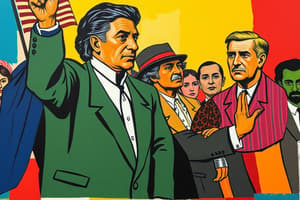Podcast
Questions and Answers
What system was implemented to grant land and labor to colonists in exchange for their service?
What system was implemented to grant land and labor to colonists in exchange for their service?
- Mercantilism
- Columbian Exchange
- Encomienda System (correct)
- Indentured Servitude
When was Jamestown founded?
When was Jamestown founded?
1607
What major document was signed in 1620 by the Pilgrims aboard the Mayflower?
What major document was signed in 1620 by the Pilgrims aboard the Mayflower?
Mayflower Compact
What war occurred from 1756-1763 between British and French forces?
What war occurred from 1756-1763 between British and French forces?
The Great Awakening occurred between 1739 and 1744.
The Great Awakening occurred between 1739 and 1744.
Which act imposed taxes on paper goods and was met with strong opposition?
Which act imposed taxes on paper goods and was met with strong opposition?
What significant event took place in Boston in 1770 involving British troops and colonists?
What significant event took place in Boston in 1770 involving British troops and colonists?
What document declared the American colonies independent from British rule?
What document declared the American colonies independent from British rule?
Who wrote 'Common Sense' in 1776 advocating for independence from Britain?
Who wrote 'Common Sense' in 1776 advocating for independence from Britain?
Which Supreme Court case established judicial review?
Which Supreme Court case established judicial review?
What was the name of the 1803 purchase that expanded U.S. territory?
What was the name of the 1803 purchase that expanded U.S. territory?
Which treaty ended the War of 1812?
Which treaty ended the War of 1812?
Flashcards are hidden until you start studying
Study Notes
Contact & Settlement (1600-1750)
- Columbus' arrival in 1492 initiated European exploration and settlement in the Americas, driven by motives of God, gold, and glory.
- Encomienda System established Spanish labor exploitation of Native Americans.
- Jamestown founded in 1607; tobacco cultivation became profitable thanks to John Rolfe's innovations.
- Virginia House of Burgesses created in 1619, marking the establishment of a representative government.
- First introduction of slavery into Colonial America occurred in 1619.
- Mayflower Compact signed in 1620, promoting self-governance among Pilgrims.
- Maryland Act of Toleration enacted in 1649, allowing religious freedom for Trinitarian Christians.
- Mercantilism thrived from the 1500s to 1700s, shaping colonial economies to benefit the mother country.
- Indentured Servitude prevalent from 1600s to 1680, providing labor in exchange for passage to America.
- Columbian Exchange transformed ecosystems and economies between the Old and New Worlds from pre-1650 to 1808.
- Navigation Acts (1650, 1663, 1696) enforced regulations on colonial trade to ensure profits for Britain.
- The Half-way Covenant (1662) allowed partial church membership for the children of baptized but unsaved church members.
- King Philip's War (1675) was a conflict between Native Americans and English settlers, driven by land disputes.
- Bacon's Rebellion (1675) highlighted colonial dissatisfaction with governance and indigenous policy.
- Salem Witch Trials took place in 1692, reflecting societal tensions and religious fervor.
Colonial Time (1700-1750)
- By 1700, English colonists had significantly settled in America, leading to the emergence of distinct urban centers and American identity.
- Great Awakening (1739-1744) revitalized religion, spearheaded by figures like Jonathan Edwards, known for "Sinners in the Hands of an Angry God."
- The Enlightenment introduced rational thought and deism into colonial culture during the 1700s.
- Salutary Neglect (1700-1763) allowed colonial autonomy, fostering a sense of independence leading up to the American Revolution.
- French & Indian War (1756-1763) redefined territorial control in North America and increased colonial tensions with Britain.
- Albany Plan of Union (1754), proposed by Benjamin Franklin, aimed at unifying the colonies against French threats.
- Following the war, the Treaty of Paris (1763) ended conflicts, while the Proclamation of 1763 restricted westward expansion.
- Series of acts imposed by Britain (Sugar Act 1764, Stamp Act 1765, and others) heightened colonial resentment against British control.
- Pontiac's Rebellion (1763-1764) demonstrated Native American opposition to British territorial policies.
The Revolution & Early Government (1770s)
- Colonial unity formed in response to British oppression, exemplified by the Sons of Liberty and Stamp Act Congress in 1765.
- First Continental Congress convened in 1774 aiming to discuss colonial grievances.
- Boston Massacre (1770) and Tea Party (1773) escalated tensions and defiance against British rule.
- Olive Branch Petition (1775) represented a final attempt at reconciliation with Britain prior to armed conflict.
- Revolutionary War officially began in 1775, culminating in the Declaration of Independence (1776).
- French Alliance established in 1777 provided crucial support against British forces.
- New governance created through the Articles of Confederation (1781), highlighting weaknesses in federal power.
- Northwest Ordinance (1784, 1785, 1787) organized the settlement of new territories.
- Treaty of Paris (1783) formally ended the war and recognized U.S. independence.
- The Constitution was drafted at the Constitutional Convention (1787), incorporating checks and balances, the Great Compromise, and the 3/5 Clause.
- Establishment of the Bill of Rights (1791) ensured personal liberties and rights.
- Key events shaped early U.S. foreign policy including Jay's Treaty (1795) and XYZ Affair (1798).
Jeffersonian Democracy (1800-1824)
- The Revolution of 1800 marked a peaceful transfer of power between political parties.
- Chief Justice John Marshall strengthened federal authority through key Supreme Court rulings (e.g., Marbury v. Madison 1803).
- Significant territorial expansion with the Louisiana Purchase (1803) and explorations by Lewis & Clark.
- Impressment of American sailors and various acts (Embargo Act 1807, Non-Intercourse Act 1809) reflected tensions leading to the War of 1812.
- Market Revolution transformed the economy with the rise of transportation innovations like the Erie Canal (1825) and the steamboat (1807).
- The War of 1812 (1812-1814) was driven by national pride and territorial disputes, concluding with the Treaty of Ghent.
- The Era of Good Feelings (1817-1823) saw a temporary decline in partisan conflict post-war.
- Economic challenges emerged with the Panic of 1819, prompting discussions on labor and union formation.
- The Missouri Compromise (1820) attempted to balance slave and free states amidst growing sectional tensions.
- The industrial revolution laid the groundwork for economic and social changes, fostering a mineral-based economy and advancements like the Waltham-Lowell System.
Studying That Suits You
Use AI to generate personalized quizzes and flashcards to suit your learning preferences.




